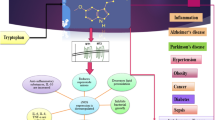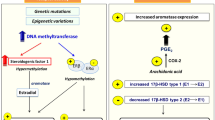Abstract
The incidence of endometrial cancer is increasing, making it the fifth most common cancer worldwide. To date, however, there is no standard therapy for patients with recurrent endometrial cancer. Melatonin, a hormone secreted by the pineal gland, has been shown to have anti-tumor effects in various tumor types. Although melatonin is available as a supplement, it has not been approved for cancer treatment. Ramelteon, a selective melatonin receptor type 1 and 2 (MT1/MT2) receptor agonist, has been approved to treat sleep disorders, suggesting that ramelteon may be effective in the treatment of endometrial cancer. To determine whether this agent may be effective in the treatment of endometrial cancer, this study investigated the ability of ramelteon to suppress the proliferation and invasiveness of HHUA cells, an estrogen receptor-positive endometrial cancer cell line. Ramelteon at 10−8 M maximally suppressed the proliferation of HHUA cells, reducing the percentage of Ki-67 positive proliferating cells. This effect was completely blocked by luzindole, a MT1/MT2 receptor antagonist. Furthermore, ramelteon inhibited HHUA cell invasion and reduced the expression of the MMP-2 and MMP-9 genes. These results suggested that ramelteon may be a candidate for the treatment of recurrent endometrial cancer, with activity similar to that of melatonin.






Similar content being viewed by others
References
Schmid D, Behrens G, Keimling M, Jochem C, Ricci C, Leitzmann M. A systematic review and meta-analysis of physical activity and endometrial cancer risk. Eur J Epidemiol. 2015;30:397–412.
Kanishi Y, Kobayashi Y, Noda S, Ishizuka B, Saito K. Differential growth inhibitory effect of melatonin on two endometrial cancer cell lines. J Pineal Res. 2000;28:227–33.
Mediavilla MD, Sanchez-Barcelo EJ, Tan DX, Manchester L, Reiter RJ. Basic mechanisms involved in the anti-cancer effects of melatonin. Curr Med Chem. 2010;17:4462–81.
Cos S, Blask DE, Lemus-Wilson A, Hill AB. Effects of melatonin on the cell cycle kinetics and “estrogen-rescue” of MCF-7 human breast cancer cells in culture. J Pineal Res. 1991;10:36–42.
Cos S, Fernández R, Güézmes A, Sánchez-Barceló EJ. Influence of melatonin on invasive and metastatic properties of MCF-7 human breast cancer cells. Cancer Res. 1998;58:4383–90.
Grin W, Grünberger W. A significant correlation between melatonin deficiency and endometrial cancer. Gynecol Obstet Invest. 1998;45:62–5.
Kato K, Hirai K, Nishiyama K, et al. Neurochemical properties of ramelteon (TAK-375), a selective MT1/MT2 receptor agonist. Neuropharmacology. 2005;48:301–10.
Miyamoto M. Pharmacology of ramelteon, a selective MT1/MT2 receptor agonist: a novel therapeutic drug for sleep disorders. CNS Neurosci Ther. 2009;15:32–51.
León J, Casado J, Carazo A, et al. Gender-related invasion differences associated with mRNA expression levels of melatonin membrane receptors in colorectal cancer. Mol Carcinog. 2012;51:608–18.
Fujimoto J, Sakaguchi H, Aoki I, Toyoki H, Khatun S, Tamaya T. Inhibitory effect of ginsenoside-Rb2 on invasiveness of uterine endometrial cancer cells to the basement membrane. Eur J Gynaecol Oncol. 2001;22:339–41.
Takeda Pharmaceuticals America, Inc. Drug interview form: Rozerem® tablets 8 mg. 2010. https://www.takedamed.com/mcm/medicine/download.jsp?id=144&type=INTERVIEW_FORM. Accessed Jul 2010.
Takeda Pharmaceuticals America, Inc. Highlight of prescribing information: Rozerem. 2005. http://www.accessdata.fda.gov/drugsatfda_docs/label/2010/021782s011lbl.pdf.
Kokkola T, Vaittinen M, Laitinen JT. Inverse agonist exposure enhances ligand binding and G protein activation of the human MT1 melatonin receptor, but leads to receptor down-regulation. J Pineal Res. 2007;43:255–62.
Oreskovic S, Babic D, Kalafatic D, Barisic D, Beketic-Oreskovic L. A significance of immunohistochemical determination of steroid receptors, cell proliferation factor Ki-67 and protein p53 in endometrial carcinoma. Gynecol Oncol. 2004;93:34–40.
Kobayashi Y, Itoh MT, Kondo H, et al. Melatonin binding sites in estrogen receptor-positive cells derived from human endometrial cancer. J Pineal Res. 2003;35:71–4.
Watanabe M, Kobayashi Y, Takahashi N, Kiguchi K, Ishizuka B. Expression of melatonin receptor (MT1) and interaction between melatonin and estrogen in endometrial cancer cell line. J Obstet Gynaecol Res. 2008;34:567–73.
Cos S, González A, Martínez-Campa C, Mediavilla MD, Alonso-González C, Sánchez-Barceló EJ. Estrogen-signaling pathway: a link between breast cancer and melatonin oncostatic actions. Cancer Detect Prev. 2006;30:118–28.
Hill SM, Frasch T, Xiang S, Yuan L, Duplessis T, Mao L. Molecular mechanisms of melatonin anticancer effects. Integr Cancer Ther. 2009;8:337–46.
Sánchez-Barceló EJ, Cos S, Mediavilla D, Martínez-Campa C, González A, Alonso-González C. Melatonin–estrogen interactions in breast cancer. J Pineal Res. 2005;38:217–22.
Di Nezza LA, Misajon A, Zhang J, et al. Presence of active gelatinases in endometrial carcinoma and correlation of matrix metalloproteinases expression with increasing tumor grade and invasion. Cancer. 2002;94:1466–75.
Mao L, Yuan L, Slakey LM, Jones FE, Burow ME, Hill SM. Inhibition of breast cancer cell invasion by melatonin is mediated through regulation of the p38 mitogen-activated protein kinase signaling pathway. Breast Cancer Res. 2010;12:R107.
Jablonska K, Pula B, Zemla A, et al. Expression of melatonin receptor MT1 in cells of human invasive ductal breast carcinoma. J Pineal Res. 2013;54:334–45.
Yumimoto K, Akiyoshi S, Ueo H, et al. F-box protein FBXW7 inhibits cancer metastasis in a non-cell-autonomous manner. J Clin Invest. 2015;125:621–35.
Wada T, Ishimoto T, Seishima R, et al. Functional role of CD44v-xCT system in the development of spasmolytic polypeptide-expressing metaplasia. Cancer Sci. 2013;104:1323–9.
Acknowledgements
The authors are grateful to Professor Fumie Kobayashi, Division of Tropical Diseases and Parasitology of Kyorin University School of Medicine, for kindly providing experimental facilities for this study.
Author information
Authors and Affiliations
Corresponding author
Ethics declarations
Conflict of interest
The authors declare that there is no conflict of interest that could be perceived as prejudicing the impartiality of the research reported.
Rights and permissions
About this article
Cite this article
Osanai, K., Kobayashi, Y., Otsu, M. et al. Ramelteon, a selective MT1/MT2 receptor agonist, suppresses the proliferation and invasiveness of endometrial cancer cells. Human Cell 30, 209–215 (2017). https://doi.org/10.1007/s13577-017-0169-7
Received:
Accepted:
Published:
Issue Date:
DOI: https://doi.org/10.1007/s13577-017-0169-7




